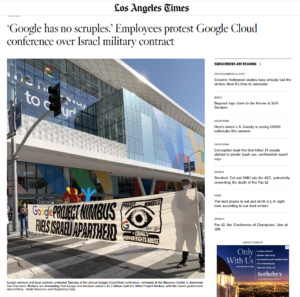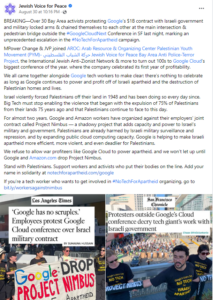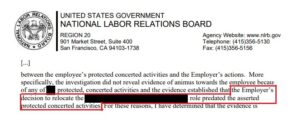The journalistic contortions and evasions in Suhauna Hussain’s Los Angeles Times coverage about an anti-Israel demonstration protesting Google’s Nimbus contract are as dizzying as Harry Potter’s record-breaking rides on his fictional broomstick by that name.
 A wholesale confirmation of her ongoing allegiance to the journalists’ protest letter placing anti-Israel partisanship ahead of ethical reporting, Hussain’s latest installment on this concocted story exemplifies journalism in a tailspin (“‘Google Has No Scruples.’ Employees protest Google Cloud conference over Israel military contract“).
A wholesale confirmation of her ongoing allegiance to the journalists’ protest letter placing anti-Israel partisanship ahead of ethical reporting, Hussain’s latest installment on this concocted story exemplifies journalism in a tailspin (“‘Google Has No Scruples.’ Employees protest Google Cloud conference over Israel military contract“).
“These terms — apartheid, persecution, ethnic supremacy — are increasingly gaining institutional recognition after years of Palestinian advocacy, and we, as journalists, need to examine whether our coverage reflects that reality,” proclaimed the 2021 open letter signed by hundreds of journalists against journalism, including The Los Angeles Times reporter. Hussain’s coverage on the orchestrated anti-Google protests, in 2021 and again last week, is the ultimate outcome when journalists trade advocacy for accuracy.
And advocate for the anti-Israel advocates she does. Several blatantly anti-Israeli groups like Jewish Voices for Peace, MPower Change, Palestinian Youth Movement openly claimed credit for their leading role in the Aug. 30 San Francisco anti-Israel demonstration. As JVP announced:
Over 30 Bay Area activists protesting Google‘s $1B contract with Israeli government and military locked arms & chained themselves to each other at the main intersection & pedestrian bridge outside the #GoogleCloudNext Conference in SF last night, marking an unprecedented escalation in the #NoTechForApartheid campaign.
MPower Change & JVP joined AROC: Arab Resource & Organizing Center Palestinian Youth Movement (PYM)- حركة الشباب الفلسطيني Jewish Voice for Peace Bay Area Anti Police-Terror Project, the International Jewish Anti-Zionist Network & more to turn out 100s to Google Cloud‘s biggest conference of the year, where the company celebrated its first year of profitability.
We all came together alongside Google tech workers to make clear: there’s nothing to celebrate as long as Google continues to power and profit off of Israeli apartheid and the destruction of Palestinian homes and lives.
 But Hussain fails to note the role of these anti-Israel advocay organizations, instead depicting the event as a grassroots effort on the part of employees, thereby falsely inflating the significance of the marginal event. “Employees protest” is the headline, ignoring the key role of anti-Israel organizations. “A protest erupted Tuesday at a Google Cloud’s conference in San Francisco, as employees critical of the company’s contract with Israel’s military sought to ratchet up pressure at the company’s annual showcase of its latest products and technology,” Hussain’s article begins, suggesting a spontaneous, impromptu in-house effort on the part of Google employees. (Strikingly, the Times runs a photograph of the protest credited to the Arab Resource and Organizing Center, while refraining to disclose the organization’s involvement in the protest.)
But Hussain fails to note the role of these anti-Israel advocay organizations, instead depicting the event as a grassroots effort on the part of employees, thereby falsely inflating the significance of the marginal event. “Employees protest” is the headline, ignoring the key role of anti-Israel organizations. “A protest erupted Tuesday at a Google Cloud’s conference in San Francisco, as employees critical of the company’s contract with Israel’s military sought to ratchet up pressure at the company’s annual showcase of its latest products and technology,” Hussain’s article begins, suggesting a spontaneous, impromptu in-house effort on the part of Google employees. (Strikingly, the Times runs a photograph of the protest credited to the Arab Resource and Organizing Center, while refraining to disclose the organization’s involvement in the protest.)
Two paragraphs later she cites former employees and unidentified “local community activists,” still failing to reveal the affiliations of these mysterious activists: “Some 30 protesters, including former Google employees and local community activists, chained themselves together.”
She perseveres in her gravity-defying narrative of a campaign driven by Google employees, stating a couple of paragraphs later: “A group of workers has opposed Project Nimbus since it launched in 2021, concerned that Google’s technology could help the Israel Defense Forces surveil and harm Palestinians.”
Indeed, last year, we first documented how for Hussain, then a tech reporter at The Los Angeles Times, “’contextualized truth’ — [ie reporting through the lens of Israeli military occupation and alleged apartheid, per the journalists’ open letter] — dictates the purging of all information indicating anything other than a grassroots employee campaign against Nimbus.” At the time, we noted that Hussain simply discarded any indications that the campaign was an outside job from the start. The Jerusalem Post reported in 2021:
However, pro-Israel activists and researchers have asserted that the timing of the #NoTechForApartheid launch and the activist affiliations of Google and Amazon employees involved in the campaign indicate that the letters were not the spontaneous grassroots efforts of concerned employees, but the result of a network of anti-Israel organizations working in concert.
Internet archives show that the #NoTechForApartheid website domain was registered on August 17, almost two months prior to the letter. Critics such as writer and researcher Emily Schrader have asserted that this strongly suggests foreknowledge of The Guardian and NBC letters’ draftings.
Upon launch, 42 organizations had already endorsed the campaign, with another eight signing later. According to experts The Jerusalem Post consulted with, it is unlikely that such a broad coalition of NGOs could be created within less than two days. …
“Given their lack of transparency, we can’t definitively comment on the authenticity of the campaign. But the notion that it’s grassroots stretches credulity,” said CAMERA’s director of communications Jonah Cohen. “Just look at the organizations who’ve ‘endorsed’ the website – they’re well-funded anti-Israel propaganda groups. Executives at Google and Amazon ought to raise a skeptical eyebrow at the whole thing.”

Like Harry Potter atop his Nimbus 2000 broomstick, Hussain engages is dizzying evasive maneuvers, eschewing ethical journalism (Flickr image by Karen Roe CC by 2.0)
Once a tech reporter and now a labor correspondent at the same paper, the agile Hussain continues to demonstrate her flexible relationship with the facts. In another accuracy-evasion maneuver, Hussain’s recent story again plays defense for Ariel Koren, a former Google employee who has been a lead player in the anti-Nimbus campaign, reporting:
In March 2022, The Times reported allegations by Koren— at the time a product marketing manager at Google for Education — that Google had retaliated against her for criticizing the contract, issuing a directive that she move to São Paulo, Brazil, within 17 business days or lose her job. Google told The Times that it investigated the incident and found no evidence of retaliation.
In her commitment to the “contextualized truth” of the anti-Israel advocates, Hussain outrageously neglects to report the actual truth of the National Labor Review Board, which dismissed Koren’s complaint based on the grounds that “the evidence established that the Employer’s decision to relocate the … role predated the asserted protected concerted activities.”
 Instead of reporting the facts as they are, Hussain defies the playing rules of ethical journalism, banking hard in a Quidditch-worthy stunt of fictional narrative in the service of anti-Israel partisans.
Instead of reporting the facts as they are, Hussain defies the playing rules of ethical journalism, banking hard in a Quidditch-worthy stunt of fictional narrative in the service of anti-Israel partisans.
See also “NY Times Conceals Evidence on Embittered Google Employee”
